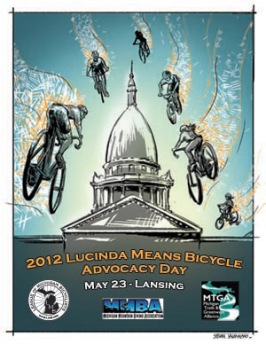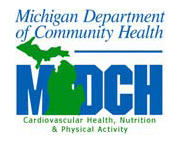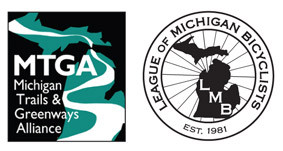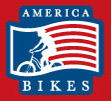You are currently browsing the tag archive for the ‘Funding’ tag.
The Healthy Environments Partnership and the Detroit Food & Fitness Collaborative Present the 2nd Round of Active Living Detroit Mini-Grants
The Active Living Detroit Mini-Grant program engages Detroiters in promoting activity friendly environments throughout Detroit. Mini-grants of up to $1000 will fund community projects aimed at promoting physical activity and environments that support active living and physical health.
Priority will be given to projects that:
- Engage community residents, particularly youth;
- Support complete streets concepts and implementation; and
- Incorporate Detroit Greenways.
Mini-grant dollars can be used for sustainable projects such as walking groups that bring local residents together for physical activity, fitness clubs organized at community centers, or efforts to improve street safety for bikers and pedestrians.
Application deadline: Wednesday, July 10, 2013
Application materials are also available on the Healthy Environments Partnership website: www.hepdetroit.org
If you have questions about submitting an application please contact:
Julia Weinert
734-763-0741
[email protected]
Stand up for Complete Streets and the preservation of non-motorized funding at the 2012 Lucinda Means Bicycle Advocacy Day on May 23rd.
Bicyclists and Complete Streets supporters will meet with members of the Michigan Legislator on May 23rd at the State Capitol to advance legislative priorities aimed to make Michigan a more bicycle-friendly state. The event will be hosted by the League of Michigan Bicyclists, Michigan Trails and Greenways Alliance and Michigan Mountain Biking Association. All non-motorized transportation advocates are encouraged to participate.
Their Advocacy Agenda (PDF) includes a number of items such as establishing vulnerable roadway user designations for bicyclists, pedestrians and wheelchair users to create enhanced penalties for drivers who injure or kill a vulnerable roadway user. Advancing bikes-on-trains is another top priority. Roll-on bike service would allow cyclists to take bicycles on-board Michigan Amtrak trains, making multi-modal travel easier in Michigan. This would extend Complete Streets principles of connectivity further than a communities geographic boundaries by linking local bicycle networks and passenger rail service.
Also included in the Advocacy Day agenda are a few bills that are raising the eyebrows of Complete Streets advocates across the state. SB 921 (Ouiment) and HB 5304 (Jansen) were both recently introduced as part of Governor Snyder’s transportation funding reform proposals. Language in these bills, needlessly eliminates the Michigan Complete Streets Advisory Council (MCSAC). The Council, comprised of representatives from 18 statewide government and non-government stakeholder agencies, was created as a result of Public Act 135 of 2010. It is charged with providing education and advice to the State Transportation Commission (STC), county road commissions, municipalities, interest groups, and the public on the development, implementation, and coordination of Complete Streets policies.
To date, the MCSAC has focused its efforts solely on drafting recommendations for the STC regarding the statewide policy for MDOT. As a result, little guidance has been provided to local units of government across the state.
While Michigan leads the nation with the most adopted Complete Streets ordinances and resolutions (over 70 in total), many communities are still hesitant to advance Complete Streets until the MCSAC provides further recommendations. The MCSAC provides valuable oversight and guidance for the effective implementation of Complete Streets throughout the state. Dissolving the MCSAC will create an unfortunate void for communities seeking to make their roads and streets safer for all users. The collective expertise of MCSAC should continue to be utilized as MDOT and local communities work to implement the finalized policy.
Another bill of concern is HB 5303, which removes a funding requirement from Act 51 that obligates communities and road agencies to spend a minimum of 1% of their transportation funding on essential non-motorized transportation projects.
Worse yet, HB 5303 includes provisions that reward funding to road agencies based on the number of Vehicle Miles Traveled (VMT) under their jurisdiction. This creates disincentives for investments in alternative transportation options such public transit systems and bicycle networks.
The bill penalizes communities and road agencies for making systemic improvements like “road diets,” a popular technique that reduces the number of travel lanes on roads designed to carry more vehicle traffic than they do in reality. A common “road diet” improvement converts four-lane roads that have lower traffic volumes into two-lane roads that also include center turn lanes and additional safety features such as bike lanes, creating new transportation options without causing additional congestion.
You can learn more about these issues and register for the 2012 Lucinda Means Bicycle Advocacy Day at www.LMB.org/advocacyday.
 Killing Bicycle & Pedestrian Funding Won’t Fix Our Bridges
Killing Bicycle & Pedestrian Funding Won’t Fix Our Bridges
Contact Your Senators Today to Save Bicycle and Pedestrian Funding
Last month, we asked you to contact your U.S. Senators to oppose Oklahoma Senator Tom Coburn’s plan to strip funding from the Transportation Enhancements (TE) program, which is the main source of the federal investment for bike projects of all types. Bicycle advocates across the country generated more than 75,000 emails to Congress in 48 hours. This rapid and powerful grassroots response succeeded: Mr. Coburn withdrew his amendment and crucial funding for bicycling was preserved.
We are sorry to report today that walk/bike infrastructure funding is under serious and immediate attack again - this time in an amendment proposed by Senator Rand Paul (KY) that would redirect all funding for Transportation Enhancements to bridge repairs. Mr. Paul’s amendment is set for a vote on Tuesday, Nov. 1 when the Senate will finalize the transportation appropriations bill, setting funding levels for FY2012.
We need you to contact Senators Levin and Stabenow today and ask them to oppose this amendment. Here are four reasons why:
- Everyone deserves to be safe. We agree on the need to keep our bridges safe, but the lives of pedestrians and cyclists are important too. Thirteen people died when the Minneapolis bridge collapsed in 2007: since then, close to 20,000 pedestrians and 2,800 cyclists have died on our nation’s highways, largely as a result of poor highway design and a lack of safe non-motorized infrastructure – exactly what the enhancement program was created to fix.
- Reallocating walk/bike funding won’t make a dent in the cost of bridge repairs. If Sen. Paul’s amendment is successful, it would eliminate approximately $700 million in federal funding for FY2012 that is used to construct sidewalks, bike lanes, bike paths, trails and other infrastructure that makes it safe for bicyclists and pedestrians to get around. Even if every penny of these funds is diverted to bridge repairs, Senator Paul’s plan will still take 80 years to fix the backlog of bridge repairs we have today.
- Transportation Enhancements provide essential transportation benefits, like reducing road congestion, improving safety, getting people active, and creating more jobs per dollar than highway-only projects. Remember that the TE program represents less than two percent of the Federal transportation program and these projects help alleviate traffic congestion, improve safety, get people active, and create more jobs per dollar than highway-only projects.
- States don’t spend all the money they already receive for bridge repairs. Remember also that last year, states sent back to Washington $530 million of unspent bridge funds in rescissions – the states are leaving bridge repair funds on the table, unspent, year after year; they should at least spend these funds first.
If the Paul amendment succeeds, it will make it much more challenging to sustain funding for Transportation Enhancements, Safe Routes to School, and Recreational Trails in the long-term transportation bill that the Environment and Public Works Committee starts debating just 8 days later on November 9.
We must turn back any amendment to strip Transportation Enhancements.
Last month, more than 75,000 messages were sent to Senators to ask them to stand strong for Transportation Enhancements. That was an amazing turnout, but we must do better this time. Every time someone in Congress attacks bicycling and walking, we must push back even stronger than we did the time before. And, we will keep doing it until bicycle and pedestrian funding is protected.
This is the third time in a month that a small group of Senators have targeted Transportation Enhancements, using a different angle each time. It is a waste of the Senate’s time and taxpayers dollars to focus on this small and valuable program when we are in dire need of real and viable solutions to fix our failing transportation system.
Please contact your Senators today to ask them to vote against the Paul amendment (SA-821) to eliminate Transportation Enhancements. Then please forward this message to at least five others who care about the safety of people walking and bicycling on our streets.
Thank you for your help today, and for passing the call to action along.
Reposted from LMB.org
FederalFederal Transit Administration (FTA) has issued a policy statement in today’s Federal Register establishing that pedestrian improvements within a half mile radius of a transit facility and bicycle improvements within a 3-mile radius of the transit facility are considered to have a de facto relationship to the transit facility. This is great news as it simplifies the eligibility determinations for use of transit funds for bicycle and pedestrian improvements.
The majority of FTA’s grant programs allow money to be spent on the design, construction, and maintenance of walking and biking projects that “enhance or are related to public transportation facilities.” But how do they determine if such a relationship exists? Until today’s announcement, the FTA had used 1,500 feet from the transit stop or station as the rule of thumb.
Additionally, in response to public comments, the FTA also included a stipulation that allows projects located beyond these distances to be eligible if walkers and cyclists could reasonable be expected to make longer trips.
LMB is extremely pleased that this new policy recognizes that successful transit depends on safe and convenient access to transit stops, especially within nearby walk and bike catch basins. Making bicycling and walking safe and attractive makes transit more accessible, practical and appealing. In addition, providing secure bike parking is far cheaper than building surface or structure automobile parking.
You can read the entire policy statement here and read more on the history of this significant policy change on the League of American Bicyclists’ blog. Below are a few excerpts specifically related to bicycling and complete streets.
“Distances beyond the ‘‘walkshed” of public transportation stops and stations may, in fact, be within the range of a short bicycle trip. Indeed, as one author stated, ‘‘[bicycles] are the perfect transportation choice for a short one- to three-mile trip to and from a transit station.” Providing secure parking and other amenities for bicycles and cyclists at public transportation stops or stations can be less expensive than providing parking for automobiles. Access to public transportation allows bicyclists the opportunity to make longer trips. Further, where physical conditions prevent a continuous bicycle trip, public transportation can provide a link to previously inaccessible destinations.”
“In addition, investing in a ‘complete street’ concept stimulates private-sector economic activity by increasing the viability of street-level retail small businesses and professional services, creating housing opportunities and extending the usefulness of school and transit facilities.” As one leading scholar noted, ‘‘Pedestrian and bicycle traffic use fewer resources and affect the environment less than any other form of transport.” If we are to create livable communities, ‘‘the range of transportation choices available to all Americans-including transit, walking, bicycling, and improved connectivity for various modes-must be expanded.”
Bikes Belong, a national organization sponsored by the U.S. bicycle industry with the goal of putting more people on bicycles more often, is accepting applications for Community Partnership Grants. The grants are designed to foster and support partnerships between local governments, nonprofit organizations, and local businesses working to improve the environment for bicycling.
Grants of up to $10,000 will be largely will be awarded to fund the construction or expansion of bicycle facilities such as bike lanes, trails, and paths. The grants committee also will consider advocacy projects that promote bicycling as a safe and accessible mode of transportation.
To be eligible for a grant, a partnership must include collaboration between at least one city/county government office or department; one nonprofit organization with a mission specific to bicycling, trails, or recreation; and one local business.
Several Michigan cities have transit funding measures on the ballot next week:
- Voters in Grand Rapids, East Grand Rapids, Wyoming, Kentwood, Grandville and Walker will be asked to expand bus service for the region and add high speed bus transit. It will fund enhanced service on every route and allow the system to keep up with rising demand - ridership on The Rapid has more than doubled in the last ten years. Learn more at RapidYes.org. Also check out this great video about Grand Rapids transit, past and future!
- Voters in Benzie County will be asked May 3 to renew and restore operating funds for the Benzie Transportation Authority with a 0.5 mill. Learn more at Benzie Bus Yes!
- Voters in Grand Haven will be asked to support a five-year 0.95 mill property tax increase to support expansion of Harbor Transit, as well as funding for the repair and construction of roads, bridges and other infrastructure.
- A 0.4 mill renewal is also on the ballot in Holland Township for the Macatawa Area Express Bus.
Many other cities will also be voting on measures to fund vital local services. So check your ballot and remember to go VOTE May 3!
 For the 2011 grant year, the following local health departments and communities have been awarded an ARRA-Complete Streets grant:
For the 2011 grant year, the following local health departments and communities have been awarded an ARRA-Complete Streets grant:
| Local Health Department | Community |
| District Health Department #10 | City of Big Rapids City of Ludington |
| Ingham County Health Department | Lansing Township |
| Marquette County Health Department | City of Marquette |
| Public Health, Delta & Menominee Counties | City of Escanaba |
| Washtenaw County Health Department | Pittsfield Township City of Ypsilanti |
| Western U.P County Health Department | City of Hancock City of Ironwood |
Eight communities were awarded an ARRA-Complete Streets grants in 2010.
An example of how policy change can be accomplished widely is in Washtenaw County. As a result of funding (in part) and assistance from the Washtenaw County Health Department, the City of Saline was able to pass a Complete Streets ordinance in September, 2010. Recently, Washtenaw area’s regional transportation planning organization, Washtenaw Area Transportation Study, decided to take on Complete Streets as a special planning and visioning project in 2011. WATS will be convening a stakeholder group and have a public engagement process to develop a Complete Streets vision for Washtenaw County, including model policy language, design recommendations, etc.
For more information on the Complete Streets program, please contact Holly Madill at [email protected] or (517) 335-8372 or Lisa Grost at [email protected] or (517) 335-9781.
Congratulations to all of the grantees! We look forward to adding more push pins to our Complete Streets policy map.
 Today, the League of Michigan Bicyclists (LMB) and Michigan Trails and Greenways Alliance (MTGA) submitted a letter opposing a proposed amendment to HB 6151 and 6152 by the County Road Association of Michigan (CRAM). As these Complete Streets bills reach the homestretch of the legislative process, CRAM is seizing this opportunity to attempt changes to Act 51, Section 10k, the only guaranteed source of funding for nonmotorized infrastructure in the state transportation budget.
Today, the League of Michigan Bicyclists (LMB) and Michigan Trails and Greenways Alliance (MTGA) submitted a letter opposing a proposed amendment to HB 6151 and 6152 by the County Road Association of Michigan (CRAM). As these Complete Streets bills reach the homestretch of the legislative process, CRAM is seizing this opportunity to attempt changes to Act 51, Section 10k, the only guaranteed source of funding for nonmotorized infrastructure in the state transportation budget.
As it currently stands, Section 10k requires (as it has for the past 32 years) that 1% of all surface transportation funding in the state transportation budget be allocated to nonmotorized transportation. Eligible projects can include sidewalks in cities and villages, bike lanes, widened shoulders, trails within the road right of way, campaigns for the safety of cyclists on Michigan roads and public education efforts in all jurisdiction that are eligible for transportation funding. This is not a hardship as jurisdictions have ten years in which to accumulate and spend these funds. It should also be noted that nonmotorized facilities, such as bike lanes and wide shoulders, have been proven to extend the life of our roads by protecting their edges.
While CRAM has made it clear from day one that they oppose these bills, they have chosen not to express their opposition publicly and instead have stated both in the House and Senate that they support these bills “in concept only.” Their last-minute attempt to tack on an unrelated issue to bills that have seen overwhelming nonpartisan support in both the House and Senate as well as the general public is certainly unfortunate to say the least.
HB 6151 and 6152 will soon be up for a vote on the Senate floor, possibly as soon as tomorrow, July 28th. We are asking all Complete Streets supporters to voice support for these bills to your State Senator and express opposition to CRAM’s efforts to eliminate mandatory nonmotorized funding in Michigan. A few bulleted concerns regarding CRAM’s ammendment are below and the letter of opposition by LMB and MTGA can be read here.
Concerns with CRAM Amendment:
- MDOT does not have the ability to leverage the large variety of different funding sources to satisfy the 1% requirement making it no longer a level playing field.
- Creates an environment of “haves, and have nots” among local road agencies. Some communities may not have the capacity, know how, or resources to leverage other sources of funding.
- Utilization of other funding sources may create challenges associated with auditing, reporting enforcement of compliance by MDOT and the Michigan Department of Treasury.
- Utilizing other sources may create issues associated with ensuring the funding is being used for appropriate non-motorized facilities.
- Current nonmotorized funding needs far exceed the current 1% requirement which means they should be using all other available funds to match or leverage the 10k investment - NOT replace it!
 In 2010, the Cardiovascular Health, Physical Activity and Nutrition Section at the Michigan Department of Community Health (MDCH) in partnership with Healthy Kids, Healthy Michigan Coalition received a grant from the American Recovery and Reinvestment Act (ARRA) at the Centers for Disease Control and Prevention to support the passage of a state level complete streets resolution and future legislation. The funding is also intended to support efforts by local health departments to pass complete streets ordinances in their communities.
In 2010, the Cardiovascular Health, Physical Activity and Nutrition Section at the Michigan Department of Community Health (MDCH) in partnership with Healthy Kids, Healthy Michigan Coalition received a grant from the American Recovery and Reinvestment Act (ARRA) at the Centers for Disease Control and Prevention to support the passage of a state level complete streets resolution and future legislation. The funding is also intended to support efforts by local health departments to pass complete streets ordinances in their communities.
Michigan Department of Community Health is also contributing additional funding to the effort. Seven health departments were awarded grants of $12,000 a piece to support local complete streets efforts.
“Passage of complete streets ordinances will help insure that our communities accommodate all forms of transportation and not just automobiles,” said Lisa Grost, Public Health Consultant for MDCH. “Increasing safety for pedestrians and bicyclists and improving physical activity levels through active infrastructure is a win-win for Michigan communities.”
For the 2010 grant year, the following local health departments and communities have been awarded the ARRA-Complete Streets grant:
| Local Health Department | Community |
| Detroit Department of Health and Wellness Promotion | City of Detroit |
| Washtenaw County Health Department | City of Saline |
| Ingham County Health Department | City of East Lansing |
| Western U.P County Health Department | City of Houghton |
| Marquette County Health Department | Marquette Township |
| Genesee County Health Department | City of Flint and City of Linden |
| Jackson County Health Department | City of Jackson |
 Just posting a friendly reminder as a follow-up on our post from last week regarding tomorrow’s Virtual Lobby Day in support of the Active Community Transportation Act, H.R.4722. Tomorrow the League of Michigan Bicyclists is leading a delegation of 13 Michigan cycling advocates to lobby for Complete Streets and more funding and federal support for bicycling in Michigan. We have a full day of meetings scheduled with Michigan Congresspeople and are asking you to back up our face to face efforts with phone calls from back home. Specifically, please help us generate support for H.R. 4722 (Act Act).
Just posting a friendly reminder as a follow-up on our post from last week regarding tomorrow’s Virtual Lobby Day in support of the Active Community Transportation Act, H.R.4722. Tomorrow the League of Michigan Bicyclists is leading a delegation of 13 Michigan cycling advocates to lobby for Complete Streets and more funding and federal support for bicycling in Michigan. We have a full day of meetings scheduled with Michigan Congresspeople and are asking you to back up our face to face efforts with phone calls from back home. Specifically, please help us generate support for H.R. 4722 (Act Act).
Learn more about the ACT Act here.
Download Issue Paper on ACT Act (and Complete Streets Bill) here.
TAKE ACTION
For those Michigan complete streets advocates not attending the National Bike Summit in Washington, DC, please participate in the Virtual Lobby Day on Thursday March 11. In conjunction with the National Bike Summit we ask that you call your representative at the same time that over 700 Summit participants will have in-person meetings in congressional offices. The combination of face to face and phone communications in support of this bill will demonstrate a strong and unified Michigan voice next week on Capitol Hill. The Virtual Lobby Day is being organized by our cycling friends at America Bikes.
We encourage you to use the talking points below to send your own alert encouraging your members to participate.
TALKING POINTS
Please call your representatives on March 11th to ask them to co-sponsor H.R.4722: “The Active Community Transportation Act.” Tell them:
- Bicycling and walking are part of the solution. Half of all trips in the United States are three miles or less, yet the majority of these short trips are made by car. Shifting more of these short trips to biking and walking would not only reduce congestion, air pollution, greenhouse gas emissions, and our dependence on oil, but will also improve physical activity, safety, and livability.
- Investing in bicycling and walking infrastructure works. Commuting by bicycle has increased 43 percent since 2000 - and by 69 percent in designated Bicycle Friendly Communities that have invested in infrastructure improvements.
- Please co-sponsor the Active Community Transportation Act (H.R.4722).
Here are the phone numbers for all the Michigan Congress people:
- Senator Carl Levin (D- MI) 202-224-6221
- Senator Debbie Stabenow (D- MI) 202-224-4822
- Representative Bart Stupak (D - 01) 202-225-4735
- Representative Pete Hoekstra (R - 02) 202-225-4401
- Representative Vern Ehlers (R - 03) 202-225-3831
- Representative Dave Camp (R - 04) 202-225-3561
- Representative Dale E. Kildee (D - 05) 202-225-3611
- Representative Fred Upton (R - 06) 202-225-3761
- Representative Mark Schauer (D - 07) 202-225-6276
- Representative Mike Rogers (R - 08) 202-225-4872
- Representative Gary Peters (D - 09) 202-225-5802
- Representative Candice Miller (R - 10) 202-225-2106
- Representative Thaddeus McCotter (R - 11) 202-225-8171
- Representative Sandy Levin (D - 12) 202-225-4961
- Representative Carolyn Kilpatrick (D - 13) 202-225-2261
- Representative John Conyers, Jr. (D - 14) 202-225-5126
- Representative John D. Dingell (D - 15) 202-225-4071
Don’t know who your Congressperson is? Visit http://capwiz.com/lab/home/ and enter your address to find out.















